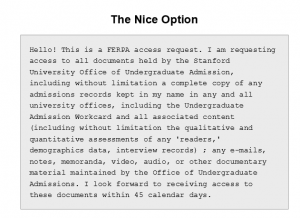
Students at Stanford University opened the floodgates when they cited the Family Educational Rights and Privacy Act (FERPA) to open access to college admission files. But at Ohio Wesleyan, interest has seen barely a trickle.
Director of Admissions Alisha Couch said only two students requested to see their admissions files, requests via emails directly copy and pasted from the original Stanford request forms.
“I think they just wanted to test us to see if they could get [the files],” Couch said. “We had to tell them to send the requests to the registrar’s office.”
Though Couch said students should be able to look at their files – without being able to take them from the office or photocopy them – she said the admissions process at OWU is straightforward and relatively transparent.
“Mainly we’re using a highlighter, like highlighting comments from letters of recommendation,” Couch said. “For our admissions files we just write general notes on the students…we use our notes to kind of connect them to the university, such as if a student is involved in LGBQTA issues, we can connect them to someone on campus who is in that community.”
Couch also said admissions counselors are willing to sit down with denied students and discuss why their applications were refused. In addition, Couch said the admissions office usually only keeps files up to two years; permanent files such as high school transcripts, standardized test scores, letters of recommendation and personal essays get sent to the Registrar.
Among OWU students, there isn’t a consensus on the appeal of looking at the files. Senior Abby Bennett said she would “definitely be interested” in seeing her admissions files while junior Max Hara said he wouldn’t because he has already been accepted into OWU.
“Why look at something that doesn’t matter anymore?” Hara said.
Though sources have been inconsistent on whether FERPA covers schools students were denied admission to, both Hara and Bennett said they wouldn’t be interested in seeing those files.
Couch said, at a bigger or more selective school, she could see why students might want access to their files.
“A lot of people want the magic formula,” Couch said, adding she could see the system potentially changing at bigger schools if more students requested admissions files. Both Bennett and Couch said there was value to having transparency in the admissions process.
“I definitely think that we [should] have a right to see the information that the school keeps on us, but I don’t think that the information has much value in general,” Bennett said.
FERPA may not cover some files, such as letters of recommendation. Students interested in accessing permanent files should send their requests to the Registrar.
